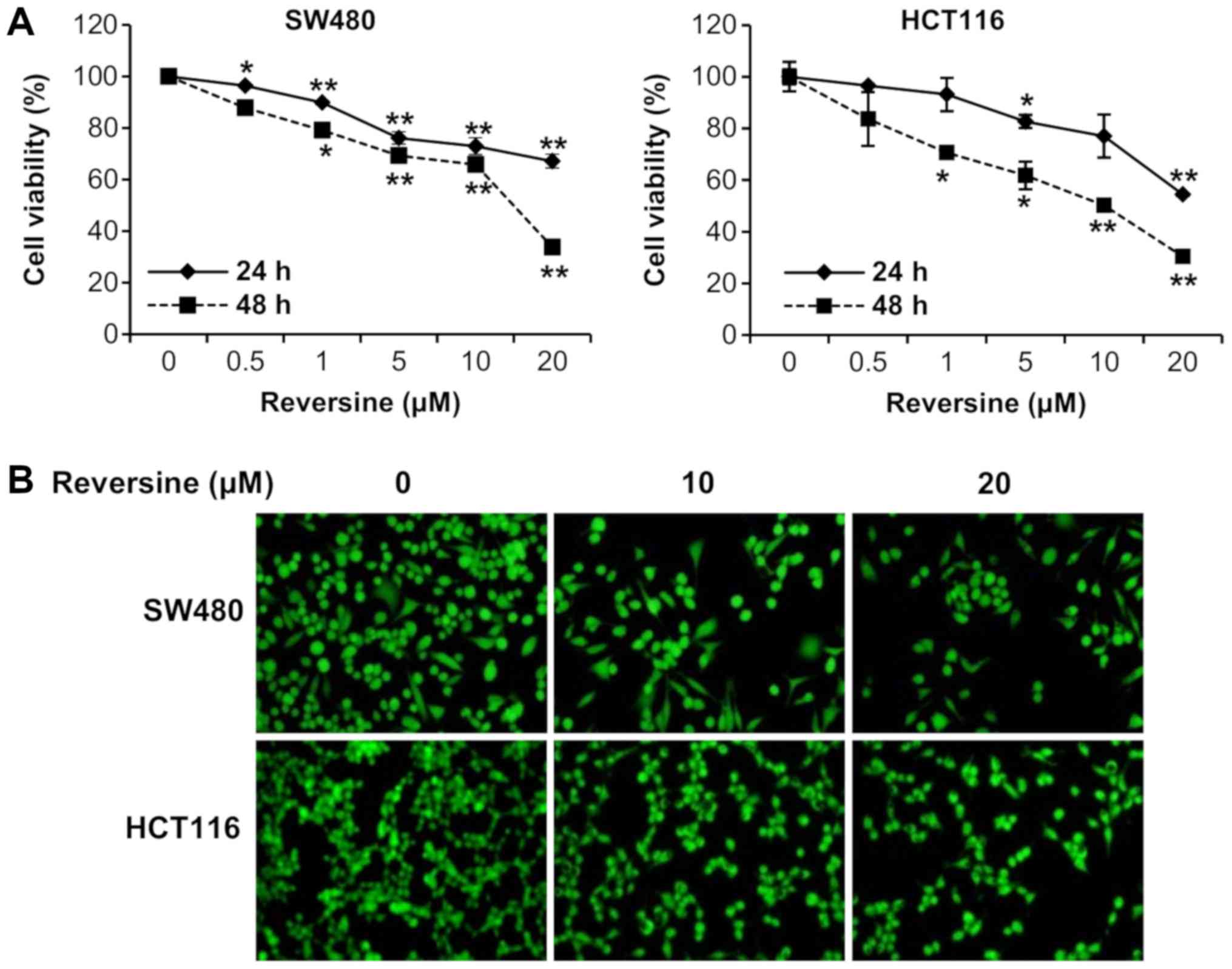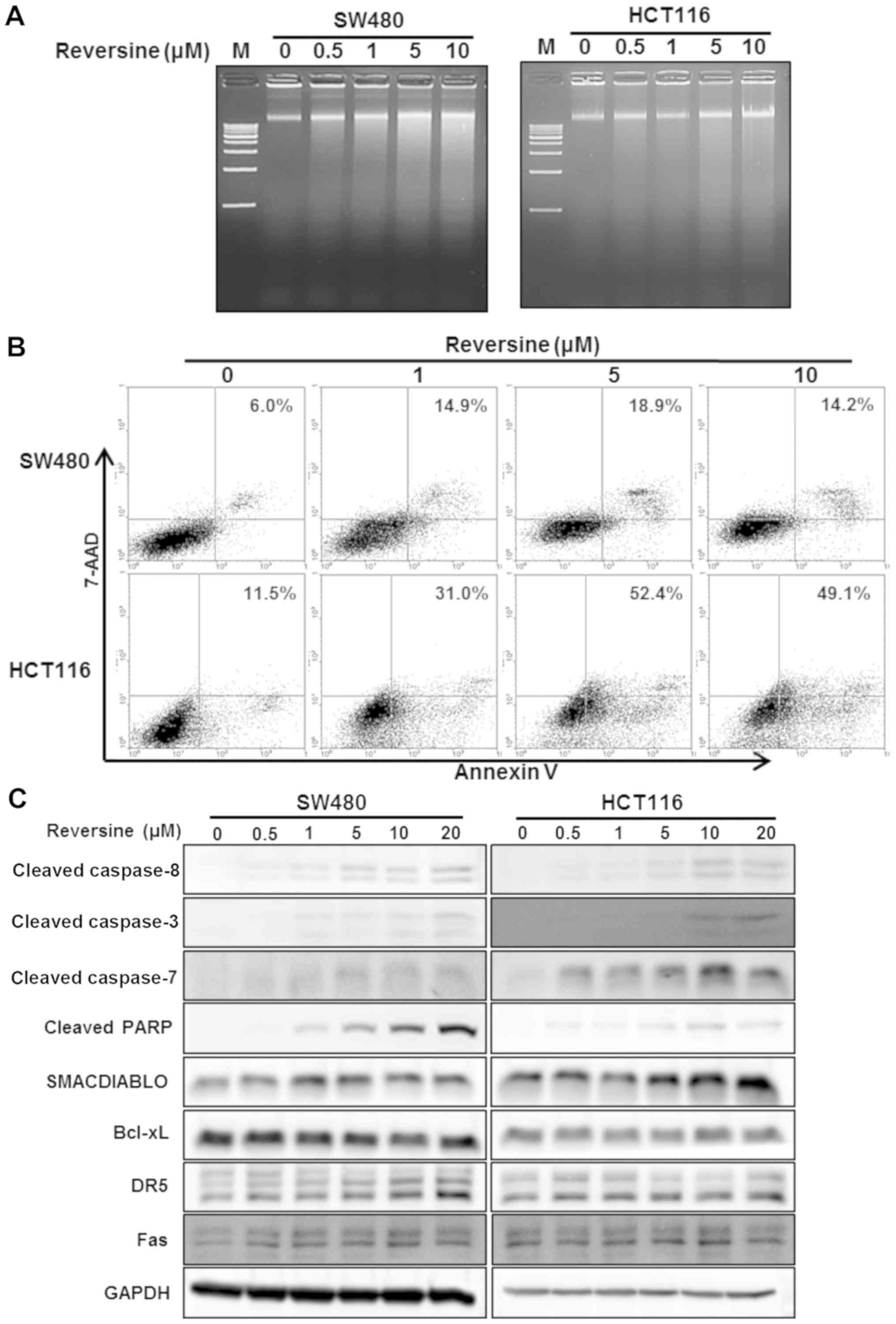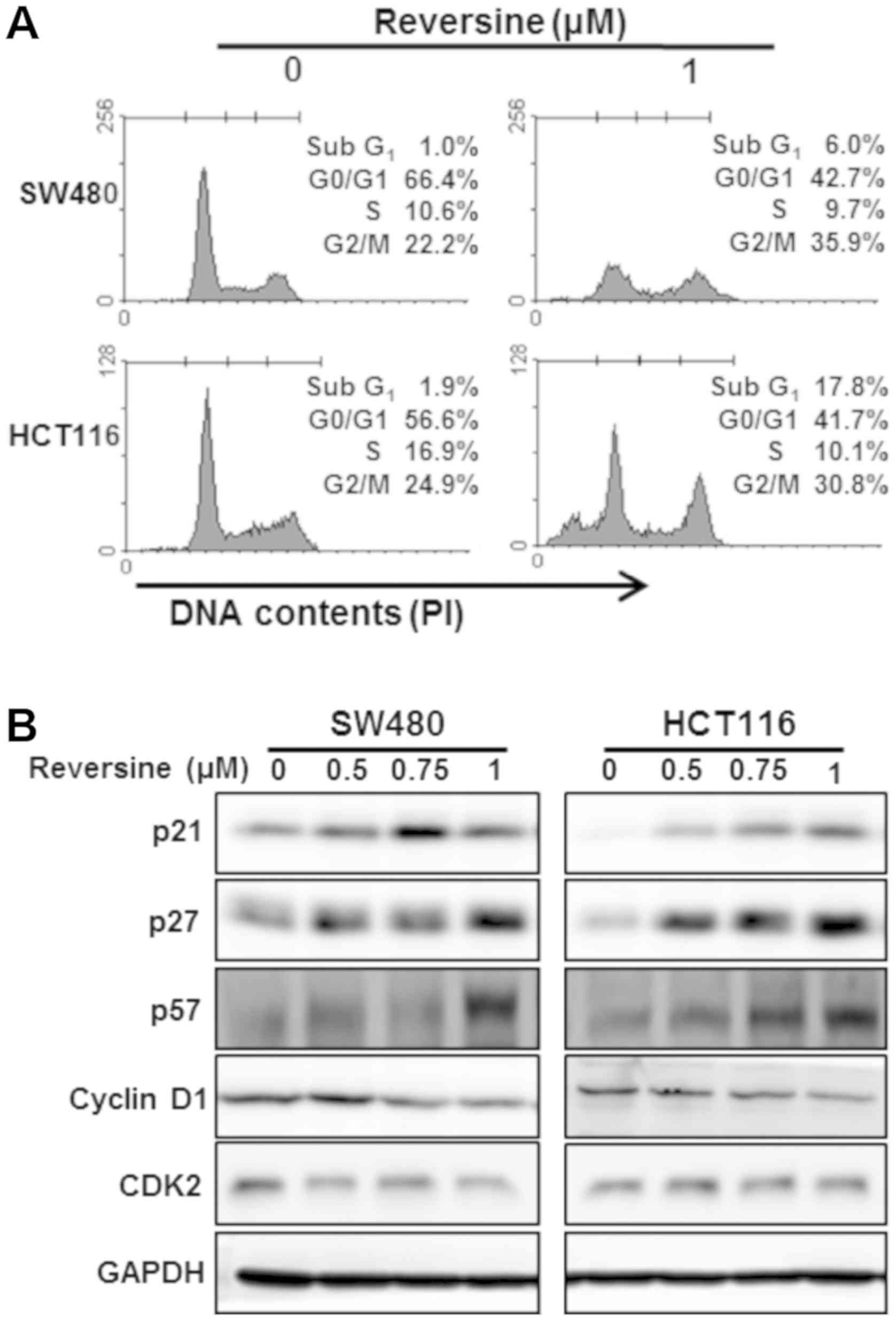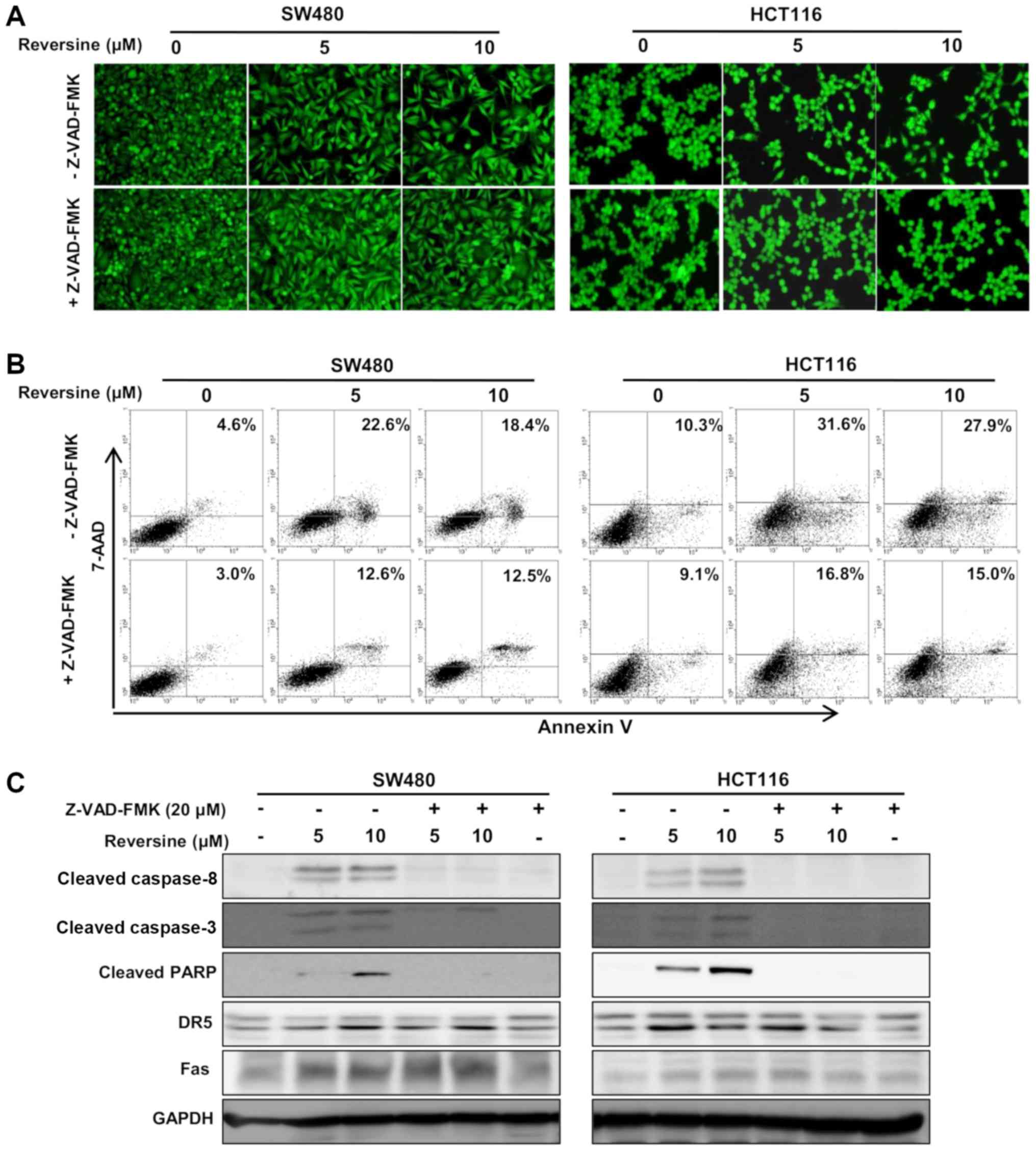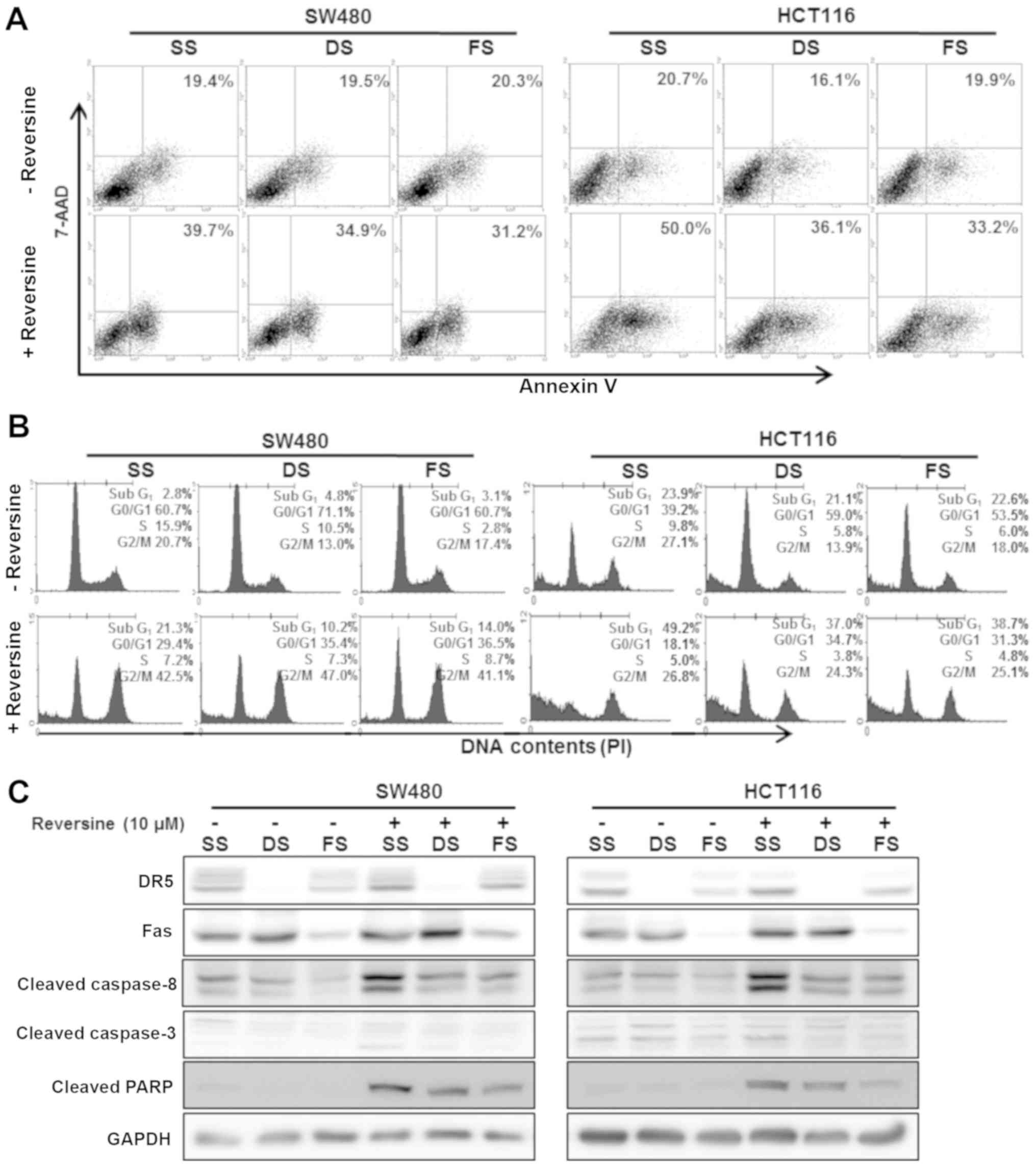|
1
|
Brenner H, Kloor M and Pox CP: Colorectal
cancer. Lancet. 383:1490–1502. 2014.
|
|
2
|
Choi Y, Sateia HF, Peairs KS and Stewart
RW: Screening for colorectal cancer. Semin Oncol. 44:34–44.
2017.
|
|
3
|
Chen S, Zhang Q, Wu X, Schultz PG and Ding
S: Dedifferentiation of lineage-committed cells by a small
molecule. J Am Chem Soc. 126:410–411. 2004.
|
|
4
|
Chen S, Takanashi S, Zhang Q, Xiong W, Zhu
S, Peters EC, Ding S and Schultz PG: Reversine increases the
plasticity of lineage-committed mammalian cells. Proc Natl Acad Sci
USA. 104:10482–10487. 2007.
|
|
5
|
Lee EK, Bae GU, You JS, Lee JC, Jeon YJ,
Park JW, Park JH, Ahn SH, Kim YK, Choi WS, et al: Reversine
increases the plasticity of lineage-committed cells toward
neuroectodermal lineage. J Biol Chem. 284:2891–2901. 2009.
|
|
6
|
Pikir BS, Susilowati H, Hendrianto E and
Abdulrantam F: Reversin increase the plasticity of bone
marrow-derived mesenchymal stem cell for generation of
cardiomyocyte in vitro. Acta Med Indones. 44:23–27. 2012.
|
|
7
|
Yan M, Wang C, He B, Yang M, Tong M, Long
Z, Liu B, Peng F, Xu L, Zhang Y, et al: Aurora-A Kinase: A Potent
Oncogene and Target for Cancer Therapy. Med Res Rev. 36:1036–1079.
2016.
|
|
8
|
Tang A, Gao K, Chu L, Zhang R, Yang J and
Zheng J: Aurora kinases: Novel therapy targets in cancers.
Oncotarget. 8:23937–23954. 2017.
|
|
9
|
Malumbres M and Pérez de Castro I: Aurora
kinase A inhibitors: Promising agents in antitumoral therapy.
Expert Opin Ther Targets. 18:1377–1393. 2014.
|
|
10
|
Hsieh TC, Traganos F, Darzynkiewicz Z and
Wu JM: The 2,6-disubstituted purine reversine induces growth arrest
and polyploidy in human cancer cells. Int J Oncol. 31:1293–1300.
2007.
|
|
11
|
Lu CH, Liu YW, Hua SC, Yu HI, Chang YP and
Lee YR: Autophagy induction of reversine on human follicular
thyroid cancer cells. Biomed Pharmacother. 66:642–647. 2012.
|
|
12
|
Piccoli M, Palazzolo G, Conforti E,
Lamorte G, Papini N, Creo P, Fania C, Scaringi R, Bergante S,
Tringali C, et al: The synthetic purine reversine selectively
induces cell death of cancer cells. J Cell Biochem. 113:3207–3217.
2012.
|
|
13
|
Kuo CH, Lu YC, Tseng YS, Shi CS, Chen SH,
Chen PT, Wu FL, Chang YP and Lee YR: Reversine induces cell cycle
arrest, polyploidy, and apoptosis in human breast cancer cells.
Breast Cancer. 21:358–369. 2014.
|
|
14
|
Bosco B, Defant A, Messina A, Incitti T,
Sighel D, Bozza A, Ciribilli Y, Inga A, Casarosa S and Mancini I:
Synthesis of 2,6-diamino-substituted purine derivatives and
evaluation of cell cycle arrest in breast and colorectal cancer
cells. Molecules. 23:E19962018.
|
|
15
|
Cheng L, Wang H, Guo K, Wang Z, Zhang Z,
Shen C, Chen L and Lin J: Reversine, a substituted purine, exerts
an inhibitive effect on human renal carcinoma cells via induction
of cell apoptosis and polyploidy. OncoTargets Ther. 11:1025–1035.
2018.
|
|
16
|
Qin HX, Yang J, Cui HK, Li SP, Zhang W,
Ding XL and Xia YH: Synergistic antitumor activity of reversine
combined with aspirin in cervical carcinoma in vitro and in vivo.
Cytotechnology. 65:643–653. 2013.
|
|
17
|
Rodrigues Alves AP, Machado-Neto JA,
Scheucher PS, Paiva HH, Simões BP, Rego EM and Traina F: Reversine
triggers mitotic catastrophe and apoptosis in K562 cells. Leuk Res.
48:26–31. 2016.
|
|
18
|
Lu YC, Lee YR, Liao JD, Lin CY, Chen YY,
Chen PT and Tseng YS: Reversine induced multinucleated cells, cell
apoptosis and autophagy in human non-small cell lung cancer cells.
PLoS One. 11:e01585872016.
|
|
19
|
Lee YR, Wu WC, Ji WT, Chen JY, Cheng YP,
Chiang MK and Chen HR: Reversine suppresses oral squamous cell
carcinoma via cell cycle arrest and concomitantly apoptosis and
autophagy. J Biomed Sci. 19:92012.
|
|
20
|
D’Alise AM, Amabile G, Iovino M, Di
Giorgio FP, Bartiromo M, Sessa F, Villa F, Musacchio A and Cortese
R: Reversine, a novel Aurora kinases inhibitor, inhibits colony
formation of human acute myeloid leukemia cells. Mol Cancer Ther.
7:1140–1149. 2008.
|
|
21
|
Jemaà M, Abassi Y, Kifagi C, Fezai M,
Daams R, Lang F and Massoumi R: Reversine inhibits Colon Carcinoma
Cell Migration by Targeting JNK1. Sci Rep. 8:118212018.
|
|
22
|
Hua SC, Chang TC, Chen HR, Lu CH, Liu YW,
Chen SH, Yu HI, Chang YP and Lee YR: Reversine, a 2,6-disubstituted
purine, as an anti-cancer agent in differentiated and
undifferentiated thyroid cancer cells. Pharm Res. 29:1990–2005.
2012.
|
|
23
|
Bijian K, Lougheed C, Su J, Xu B, Yu H, Wu
JH, Riccio K and Alaoui-Jamali MA: Targeting focal adhesion
turnover in invasive breast cancer cells by the purine derivative
reversine. Br J Cancer. 109:2810–2818. 2013.
|
|
24
|
Kiechle FL and Zhang X: Apoptosis:
Biochemical aspects and clinical implications. Clin Chim Acta.
326:27–45. 2002.
|
|
25
|
Schultz DR and Harrington WJ Jr:
Apoptosis: Programmed cell death at a molecular level. Semin
Arthritis Rheum. 32:345–369. 2003.
|
|
26
|
Llambi F and Green DR: Apoptosis and
oncogenesis: Give and take in the BCL-2 family. Curr Opin Genet
Dev. 21:12–20. 2011.
|
|
27
|
Lim S and Kaldis P: Cdks, cyclins and
CKIs: Roles beyond cell cycle regulation. Development.
140:3079–3093. 2013.
|
|
28
|
Soták M, Sumová A and Pácha J: Cross-talk
between the circadian clock and the cell cycle in cancer. Ann Med.
46:221–232. 2014.
|
|
29
|
Bonelli P, Tuccillo FM, Borrelli A,
Schiattarella A and Buonaguro FM: CDK/CCN and CDKI alterations for
cancer prognosis and therapeutic predictivity. BioMed Res Int.
2014:3610202014.
|
|
30
|
Wang K, Baldwin GS, Nikfarjam M and He H:
p21-activated kinase signalling in pancreatic cancer: New insights
into tumour biology and immune modulation. World J Gastroenterol.
24:3709–3723. 2018.
|
|
31
|
Bencivenga D, Caldarelli I, Stampone E,
Mancini FP, Balestrieri ML, Della Ragione F and Borriello A:
p27Kip1 and human cancers: A reappraisal of a still enigmatic
protein. Cancer Lett. 403:354–365. 2017.
|
|
32
|
Kobatake T, Yano M, Toyooka S, Tsukuda K,
Dote H, Kikuchi T, Toyota M, Ouchida M, Aoe M, Date H, et al:
Aberrant methylation of p57KIP2 gene in lung and breast cancers and
malignant mesotheliomas. Oncol Rep. 12:1087–1092. 2004.
|
|
33
|
Villa-Morales M and Fernández-Piqueras J:
Targeting the Fas/FasL signaling pathway in cancer therapy. Expert
Opin Ther Targets. 16:85–101. 2012.
|
|
34
|
Mocellin S: Targeting death receptors to
fight cancer: From biological rational to clinical implementation.
Curr Med Chem. 17:2713–2728. 2010.
|
|
35
|
Tschumi BO, Dumauthioz N, Marti B, Zhang
L, Schneider P, Mach JP, Romero P and Donda A: CART cells are prone
to Fas- and DR5-mediated cell death. J Immunother Cancer.
6:712018.
|
|
36
|
Wang X, Xue Q, Wu L, Wang B and Liang H:
Dasatinib promotes TRAIL-mediated apoptosis by upregulating
CHOP-dependent death receptor 5 in gastric cancer. FEBS Open Bio.
8:732–742. 2018.
|
|
37
|
Shlyakhtina Y, Pavet V and Gronemeyer H:
Dual role of DR5 in death and survival signaling leads to TRAIL
resistance in cancer cells. Cell Death Dis. 8:e30252017.
|
|
38
|
Karbasi A, Borhani N, Daliri K, Kazemi B
and Manoochehri M: Downregulation of external death receptor genes
FAS and DR5 in colorectal cancer samples positive for human
papillomavirus infection. Pathol Res Pract. 211:444–448. 2015.
|















